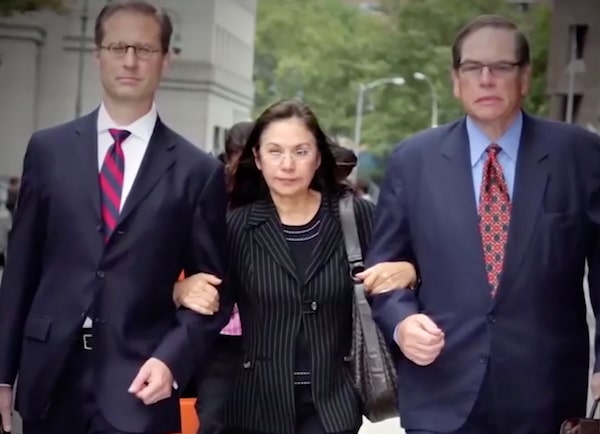
Made You Look: A True Story About Fake Art chronicles the largest art-fraud case in history.
- Made You Look: A True Story about Fake Art
- Written and directed by Barry Avrich
- Classification N/A; 90 minutes
In 2004, the Italian business executive Domenico De Sole and his wife Eleanore bought a “beautiful” Mark Rothko painting from New York’s venerable Knoedler Gallery for US$8.3-million. Twelve years later, they sued the gallery and its director Ann Freedman, alleging the painting was fake.
The dark and slippery mystery probed in Made You Look: A True Story about Fake Art is not whether the Rothko was a forgery – it was produced by a Chinese immigrant artist in a garage in Queens – but whether Freedman knew what she was selling. In this documentary by Toronto writer, director and producer Barry Avrich, she emerges as preternaturally composed considering the allegations that she was knowingly passing off fakes destroyed the gallery and her career.
Jose Carlos Bergantinos, the crumpled Spanish art dealer who probably masterminded the scam (and conveniently returned to his homeland to avoid facing charges in the U.S.) is clearly lying to Avrich. Various lawyers are obviously manufacturing outrage for the camera. But in long interviews, the slim, silver-haired Freedman’s cool sophistication and patrician air never let her down. That remarkable did-she-or-didn’t-she performance, along with a twisting tale of art-world delusions and billionaires’ egos, make the doc a suitably distracting entertainment. Made You Look launches Hot Docs At Home, a virtual version of the annual documentary festival, on CBC Thursday.

Avrich's film stokes skepticism about the way art has become a hot commodity for the one-percenters.Supplied
Avrich is reviving a story that riveted New York society four years ago when the De Sole case came to trial. Since the 1990s, Freedman had sold 60 paintings provided to her by a Long Island art dealer named Glafira Rosales and including works purported to have been painted by all the greats of abstract expressionism: Rothko, Jackson Pollock, Robert Motherwell and Clyfford Still. Rosales claimed she was an intermediary for a mysterious Swiss or Mexican seller; he had inherited the trove of art from his father, who had purchased it directly from the artists in New York in the 1950s.
As more and more of these paintings emerged, there were red flags all over this odd story, but Freedman was apparently convinced – as were many other experts. On camera and off, the experts trip all over themselves now backing away; those are the few moments when you have full sympathy for Freedman. Initially, it appears the Knoedler case was one of a group delusion: As one expert failed to express doubts – it was Rothko’s son who called the De Sole painting beautiful – another would take their word for it and so on. The one interviewee most firmly in Freedman’s corner is Maria Konnikova, the author of a book on con artists, who hypothesizes about the way in which Rosales drew the art dealer into the scam.
Konnikova is one of at least a dozen authors, journalists, art experts and lawyers interviewed. There are so many figures in this doc, the cast of characters can be hard to follow and some pruning, especially in the early scenes, would be welcome. There’s also an odd Canadian footnote to the story – Knoedler sold work to Toronto art collector and theatre producer David Mirvish. Since he declined to be interviewed, however, Avrich can only make an insider’s nod to his involvement, briefly displaying an invoice with his name on it.

Glafira Rosales, facing tax-evasion and wire-fraud charges, confessed in 2013.Supplied
Many other embarrassed collectors, meanwhile, must also have backed away in haste, because while 60 paintings were sold for a total of US$80-million, only 10 buyers actually sued when the whole scheme unravelled in 2009. Rosales, facing tax-evasion and wire-fraud charges, finally confessed in 2013. Of those suits, only the De Soles’ case made it to the courtroom, and since the former CEO of Gucci is also chair of the board of Sotheby’s, that must have been a pretty embarrassing admission, too. Eleanore De Sole takes the con harder than her husband and comes across in the film as mighty peeved. The patrician Freedman, meanwhile, never wavers, always reasonable, always explaining, as the evidence against her piles up.
However much she knew, she is not someone you would ever regard as a victim. Like another gripping art-market exposé, the 2018 doc The Price of Everything, this is a film in which few of the high-flying characters emerge as admirable. Indeed, Made You Look stokes more skepticism about the way art has become a hot commodity for the one-percenters.
Made You Look premieres Thursday on CBC and CBC Gem at 8 p.m. (8:30 NT) and documentary Channel at 9 p.m. ET/10 p.m. PT, and will be available to stream on CBC Gem for 30 days.
Plan your screen time with the weekly What to Watch newsletter. Sign up today.